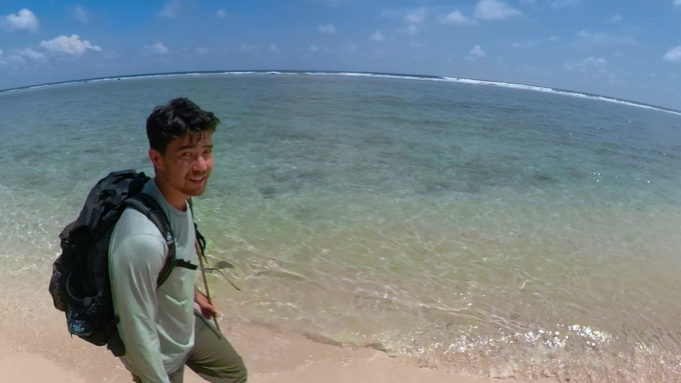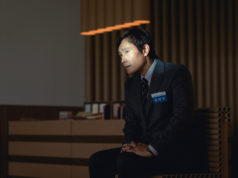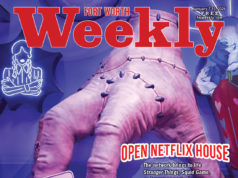Even before the pandemic, people predicted the dismal current state of documentary films. Nonfiction is drawing next to no one at the theaters, and the streaming services are full of airy, content-free docs about already famous people like David Beckham and Lionel Messi. Despite this, I saw tons of stuff on streaming and on the big screen that educated me about things I didn’t know, made me think anew about things I thought I knew, and dazzled me with cinematic creativity. Here are the best documentary films I saw this past year.
1.) Christian missionary John Chau learned the lesson of Ferdinand Magellan and James Cook: You go meddling with a foreign culture that you don’t understand, and somebody’s arrow winds up in your neck. Amanda McBaine and Jesse Moss’ The Mission tells his story through interviews, animation, and excerpts from his and his father’s journals read by actors. Maybe most interesting is how this National Geographic documentary bashes NatGeo for romanticizing people who’ve had no contact with the modern world. This inexorable tragedy (and the year’s best Christian film) shows where religious faith becomes madness. Leave the people of North Sentinel Island the hell alone.
2.) “My brain will desperately want to forget all this, but the camera will not let it happen,” says Mstyslav Chernov in 20 Days in Mariupol. When the Ukrainian journalist heard that the Russians were coming through this city on the Black Sea in early 2022, he rushed over there and documented the invaders bombing the maternity ward of the hospital he was staying in. His account of the three weeks he spent in the city is as breathlessly and tightly edited as any action thriller that played in theaters this year. You can see it for free on YouTube.
3.) Hope you’re hungry. If you’re not, you will be after spending four hours watching Chef Michel Troisgros and his cooks prepare delectable French dishes in Menus-Plaisirs — Les Troisgros. As he has done with other institutions, Frederick Wiseman examines every facet of this three-Michelin-starred restaurant in rural France that seeks to break new ground in sustainable farm-to-table dining. The 93-year-old Wiseman keeps adding to his legacy of great documentaries, and this film shows him at his most appealing.
4.) Transgender philosopher Paul B. Preciado has generally spent his time writing essays and curating art shows, but he takes to his first filmmaking effort like he was born for it in Orlando, My Political Biography. The Spaniard who has lived and worked extensively in France takes an incredibly sophisticated angle on his own life and the seminal influence of Virginia Woolf’s Orlando, staging scenes from the novel with trans actors portraying the century-spanning hero(ine). The way he weaves all this together is awe-inspiring.
5.) Olfa Hamrouni raised her Four Daughters in a relatively liberal Muslim environment in Tunisia, and yet her two oldest girls ran off to kill people for ISIS. Kaouther Ben Hania’s film tells this story but tells it slant by having Hamrouni interact with her two remaining daughters and two actresses cast as the girls, the real-life versions of whom are currently sitting in a Libyan prison. Like Preciado, Ben Hania brings together real testimonies and filmed reenactments to create a compelling form of truth.
6.) One of the year’s best animated films was They Shot the Piano Player, a mix of documentary and fiction. An American music critic (Jeff Goldblum) hears the recorded piano stylings of Francisco Tenório Júnior, then travels all over Brazil and Argentina to find out what happened to the samba musician, who went out for sandwiches one night in 1976 and was never seen again. Samba’s all-time greats weigh in on what Tenório Júnior could have achieved, and his sad story plays out in riotous colors by directors Fernando Trueba and Javier Mariscal.
7.) If you weren’t around in the late 1980s, you might have trouble fathoming what a huge Hollywood star Michael J. Fox was at that time. Davis Guggenheim casts his gaze on the actor, his short-statured frame ravaged by Parkinson’s, in Still: A Michael J. Fox Movie. He received his diagnosis when he was still in his 20s, and his sense of living on borrowed time contributed to mistreating people and starring in bad movies (Life With Mikey, anyone?). Now Fox looks back on his life with perspective and no small amount of humor: “In 20 years, I’ll either be cured, or I’ll be a pickle.”
8.) Maybe the prospect of a four-hour Holocaust documentary (four and a half with the intermission) makes you want to crawl underneath the covers, but in Occupied City, Oscar-winner Steve McQueen gives us no historical footage, no photos of the victims or the killers, no interviews with survivors. Instead, he adapts a book by his wife, Bianca Stigter, and shows us footage of the city of Amsterdam during and after the COVID lockdown while narrator Melanie Hyams tells us about the atrocities and acts of resistance that happened at the addresses we see. It makes for an unexpectedly light film, pointing toward the future while acknowledging the past.
9.) Danish director Lea Glob spent more than a decade following French-born fellow Dane Apolonia Sokol from her days as a struggling painter in Paris to becoming an art-world star, with stops in New York, Los Angeles, Szczecin, and Istanbul. The result is Apolonia, Apolonia, tracking the artist’s fights against self-doubt and sexism in the art establishment, as well as her affair with a stunningly pretty Ukrainian fashion model, which ends in crushing fashion. In less than two hours, the film seems to capture an artist’s whole maturity.
10.) We end with a tie. Renaissance: A Film by Beyoncé and Taylor Swift: The Eras Tour both make it onto this list on their artistic merits, but they also proved to be pop-culture phenomena, and how many documentaries reach that status? They captured perhaps the world’s two biggest music stars right now at the height of their form, and they also pointed to a possible way forward for movie theaters still recovering from the pandemic.
Honorable mention: Raoul Peck’s Silver Dollar Road … Nicole Newnham’s The Disappearance of Shere Hite … Sara Nodjoumi and Till Schauder’s A Revolution on Canvas … Errol Morris’ The Pigeon Tunnel … Lucien Castaing-Taylor and Véréna Paravel’s De Humani Corporis Fabrica … Julie Cohen’s Every Body … Hubert Davis’ Black Ice … Matthew Heineman’s American Symphony … Moses Bwayo and Christopher Sharp’s Bobi Wine: The People’s President … Anna Hints’ Smoke Sauna Sisterhood … Nisha Pahuja’s To Kill a Tiger … D. Smith’s Kokomo City … Joe Brewster and Michèle Stephenson’s Going to Mars: The Nikki Giovanni Project … Laura McGann’s The Deepest Breath … Wim Wenders’ Anselm … Sam Green’s 32 Sounds.












